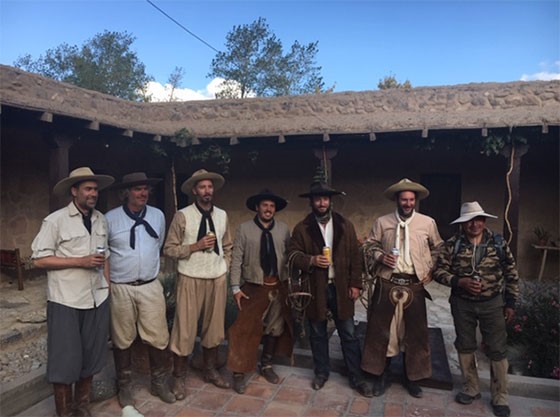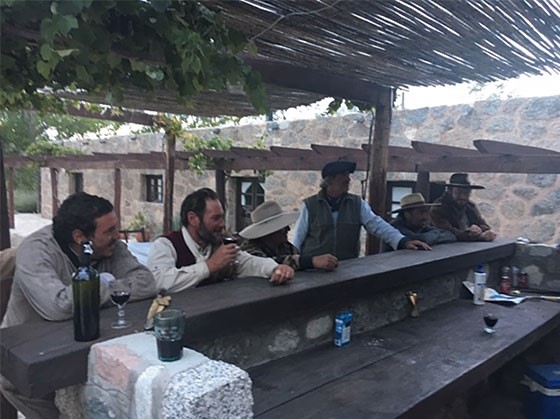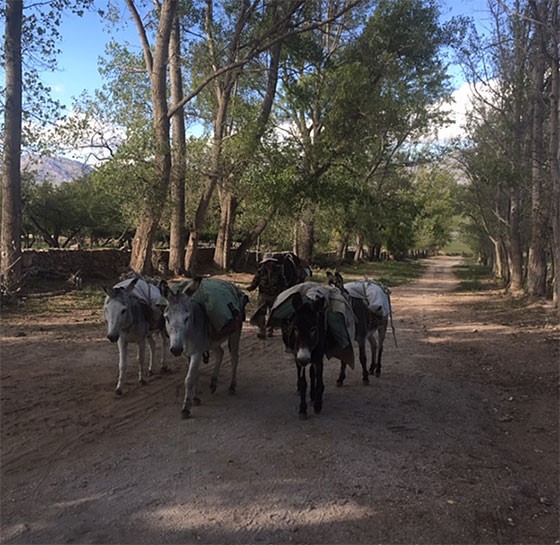This week, we got a surprise.
Eight gauchos rode up, after crossing over the pass from the high ‘puna.’ They dressed in traditional regalia, with their bombacho pants, chaps, boots, wide hats…and each with his knife behind his back.



With them was a muleteer, Chancho, whose job was to bring the pack animals up the rear.
Mounted on local criollo horses, they had been riding and camping for five days, mostly in the back of our ranch, where it is so far away from the main house, and so high, we have never been able to see it.
Always a gaucho
A couple of years ago, we organized an expedition to explore the western part of the ranch, where it stretches into a high desert towards Chile.
Our group rode for about 12 hours, out to our most remote ‘puesto.’ There, a lonely shepherd — a woman with a gimpy leg — keeps a herd of llama and lives in a rude, stone house in the upper part of the valley.
We camped next to her house, spending a frozen, wind-swept night studying the bright stars overhead and gasping for air.
In the middle of the night, thus engaged, we decided not to continue. It was too high and too cold. That was about 12,000 feet.
The gauchos didn’t seem to mind it. It’s earlier in the season, so it’s not so cold. And they had approached from the other side of the ranch…swinging far out into the desert…camping at 14,000 feet next to the one and only river in the area. But we will let them tell their story:
‘We are all cousins. We’re all descended from Robustiano Patron-Costas, who was a candidate for president of Argentina in the 1940s. Today, we live all over the province, and down in Buenos Aires, but we like to get together every once in a while and do a horseback ride.
‘We organized the trip with [our neighbour]. The horses came up on trailers. And then, we rode out behind these mountains [he pointed to the ridge to the west of our house]. It took two days to reach the river that is on the back of your property. We camped there for a day, fishing. We got 20 trout. They were delicious.’
The young man talking was a lawyer, specialising in labour law. He introduced the group. There were journalists and businessmen who made their livings in the city. But there were also some local farmers.
‘We don’t dress like this all the time. Well…Pablo does.’
He gestured towards one of the group, whose outfit and its wearer looked as though they had both suffered more wear and tear than the rest. His face was well weathered by wind and sun. And around his shoulders, in place of the traditional jacket worn by the others, was a vicuña shawl.
‘Pablo comes from the rich side of the family. His grandfather owned the palacio in Buenos Aires that is now the Hyatt Hotel. He went to good schools. He wore a suit and tie. He speaks English. But he decided he didn’t want that.
‘Pablo dresses like a gaucho all the time. Because he is a gaucho. Even when he goes to Buenos Aires…or even to the US, I guess. The rest of us are more modern. We have normal jobs and careers. But we don’t want to lose our gaucho roots. I tell people I am a fake gaucho. But it is not true.
‘What I really am is a fake lawyer…a fake city-dweller…a fake modern man. I feel most real…most authentic…as if this is really who I am…when I put on my gaucho costume and go riding out into the mountains.’
Originario trouble
We invited the cousins to join us for dinner in the house. (We offered beds, too, but they insisted on sleeping in a barn.) A jolly conversation, enlivened by more than a dozen bottles of our own Malbec, developed. One of the gauchos explained the originario problem:
‘It’s not really a stupid law. It was designed to protect real Indians — people who are living in a traditional way on their traditional land, speaking their traditional languages. And there still are some up in the north, for example.
‘When the law came out — that was in the ’90s — the governor of this province should have clearly explained what it was all about. He could have said that it doesn’t apply here. Because we don’t have any people like that.
‘These local people who claim to be originarios here are something altogether different. They are not from here. The Inca moved them. And then the Spanish moved them again. And they married in with the Spanish families. They don’t have any traditional Indian culture…or any traditional languages.
‘Now, they drive pickup trucks…they speak Spanish…their kids go to the public schools…they collect their welfare checks — just like everyone else.
‘They claim to be Diaguita. But there never was a Diaguita tribe. The word comes from the Inca, who used it to describe local Indians they considered inferior. So, it’s really an insult. And it makes no sense for these people to call themselves ‘Diaguita.’ And the guy who claims to be the ‘cacique’ — or chief — of the Diaguita doesn’t even live on the land he claims. He lives in the city and works on construction jobs.
‘You know, they want to take your land. They’re claiming all the back part of your ranch…and both of the ranches next to you. But there is no traditional tribe that inhabited those areas. There were several tribes in the valley, but none of them were ‘Diaguita.’ And the real tribes — the Pulares and the Chicoana — no longer exist.’
Cowboy songs
After the ‘asado’ — an Argentine barbecue — we moved from the dining room to an open fire outside. And the guitars came out. Several of the gauchos had songs to sing. Like cowboy songs, they were sad laments of loneliness and lost love.
We did our part, giving them a poor rendition of Johnny Cash’s ‘Folsom Prison Blues’ and Hank Williams’ ‘Your Cheatin’ Heart.’
‘I know it must seem a little silly,’ said a bearded gaucho. ‘I mean, us dressing up like this. And riding through the hills as if this were the 19th century.
‘But it was here in Salta Province that Martín Miguel de Güemes beat the Spanish in the war for independence. And he didn’t have an army. All he had was gauchos. I guess when we do this, we feel a little of his victory…and a little pride in what we are and who we are.’
And gradually, the dark of night deepened…the stars sparkled…
The drinking and singing continued until we all slumped into a sweet sleep of nostalgia, lost dreams, and red wine.
Regards,
Bill Bonner





Since founding Agora Inc. in 1979, Bill Bonner has found success and garnered camaraderie in numerous communities and industries. A man of many talents, his entrepreneurial savvy, unique writings, philanthropic undertakings, and preservationist activities have all been recognized and awarded by some of America’s most respected authorities. Along with Addison Wiggin, his friend and colleague, Bill has written two New York Times best-selling books, Financial Reckoning Day and Empire of Debt. Both works have been critically acclaimed internationally. With political journalist Lila Rajiva, he wrote his third New York Times best-selling book, Mobs, Messiahs and Markets, which offers concrete advice on how to avoid the public spectacle of modern finance.